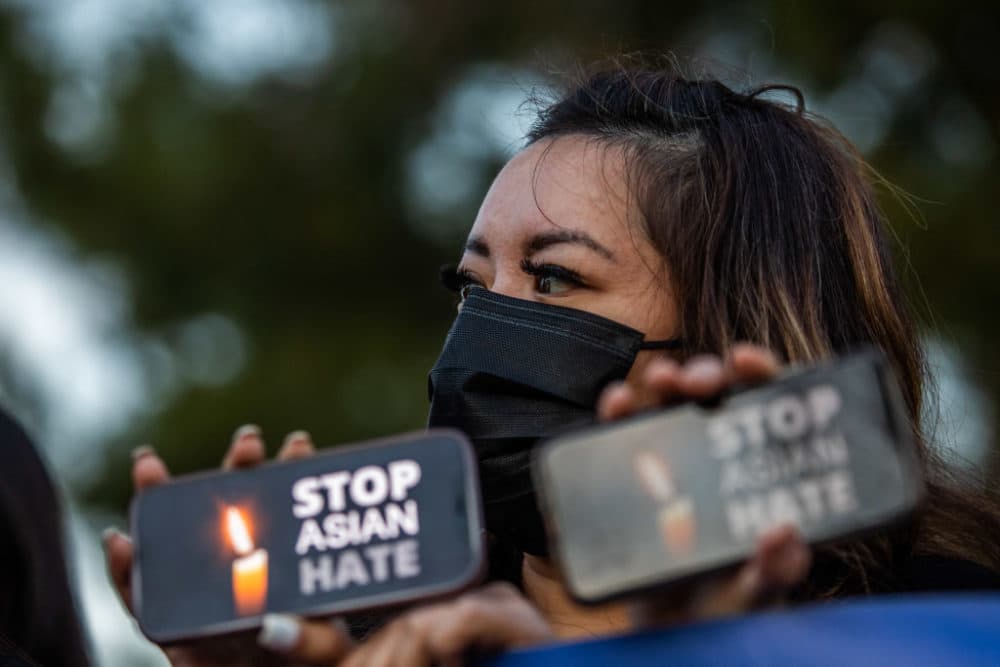Advertisement
Commentary
Call The Shootings In Atlanta What They Were: Targeted Violence Against Asian American Women

For me and other Asian American women, the news about the murders in Georgia on Tuesday night cut deep into our wounds, dug into our scars from our experiences growing up in the United States. As I read the statistics of the deceased, the locations of the attacks and stared at the face of the murderer — the motivations of the shootings were immediately and painfully clear in my mind.
Yet I read multiple news stories, one right after another, that reported it was “unclear” and “unconfirmed” whether or not there were racial motivations behind killings. I listened to officials who proclaimed that the attacks were due to his “sexual addiction” and “not racial bias,” using the words of the perpetrator to contextualize his actions, rather than letting the facts of the matter speak for themselves.
What these statements disregard and oversimplify is that racism and the sexual violence perpetuated against Asian women are not separate issues, but matters that are inextricably intertwined with one another.
For my entire life, I feel like I have been unable to escape the constraints imposed on me by the stereotypes associated with my identity as an Asian woman. There are the racial catcalls shouted at me as I walk down the street, the overt fetishization from men I’ve encountered while dating that have been normalized into the demeaning term “yellow fever,” and even the microaggressions about my looks from the patients who I care for in professional settings.
So, when I looked into the eyes of the shooter in Atlanta through my computer screen, I saw within them the entitlement of the men who felt like they had the right to my body. I could feel myself shaking with the fear I felt, from the risk of experiencing violence, anger and assault whenever I told them to stop.
[R]acism and the sexual violence perpetuated against Asian women are not separate issues, but matters that are inextricably intertwined with one another.
Six out of eight of the victims were Asian females, murdered in a rampage that started at Young’s Asian Massage Parlor. This was not merely a coincidence. Many vulnerable Asian women work in low-income service jobs in massage parlors and nail salons, subjected to various dangers associated with these workplaces. Unfortunately, these businesses are also commonly used as fronts to exploit immigrant women into human trafficking and prostitution networks, even around the Boston area.
These narratives of marginalized women are also often erased by the “Model Minority Myth” — the belief that Asian Americans are uniformly successful, able to achieve the “American Dream” simply by working hard and staying silent about any transgressions that they experience. Yet, Asian Americans also have the greatest income inequality out of any ethnic groups in the United States, with the top 10% earning 10.7x as much as the bottom 10%.
The objectification of Asian women has been consistently perpetuated by the media, reducing our complex human identities into oversexualized tropes. Hollywood movies have created juxtaposing representations of Asian women as either submissive “Lotus Blossoms” who purely exist to serve their White male counterparts, or “Dragon Ladies” acting as sources of temptation to lead these men astray. These depictions have their roots from both colonization, resulting from U.S. military presence in Vietnam and Korea, and xenophobia, as exemplified in the Page Law of 1875 that banned the immigration of Chinese women after characterizing them as “all prostitutes or concubines.” These stereotypes are actively harmful, making Asian women especially susceptible to being victims of sexual harassment.
Advertisement
[W]hen I looked into the eyes of the shooter in Atlanta through my computer screen, I saw the entitlement of the men who felt like they had the right to my body.
The statistics about the violence that Asian American and Pacific Islander (AAPI) women face is especially harrowing. Of the nearly 3,800 hate incidents reported to the organization Stop AAPI Hate over the last year, nearly 70% were directed at females. Additionally, anywhere from 23-54% of AAPI women have experienced sexual or intimate partner violence during their lifetimes. However, Asian American women are the least likely to report sexual assault compared to their white, Latina and Black counterparts. The tragedy associated with the recent shooting is simply the latest in a long history of violence, and unfortunately it will not be the last.
There is no question in my mind that this attack was fueled by the hatred from racism, xenophobia and misogyny. Yet the news stories and statements by officials refuse to admit these issues outright.
Without the mainstream acknowledgement that these shootings were a hate crime against Asian women, we cannot work to address the true issues we face at hand. Without this acknowledgement, I must continue to take on the burden myself to explain it to others and to defend the pain that I feel. Without proper acknowledgement, our community cannot heal.
